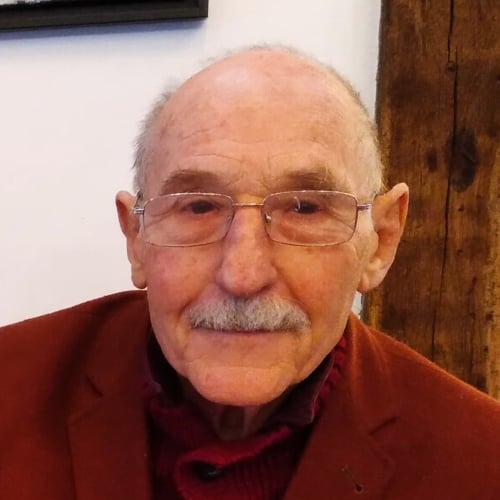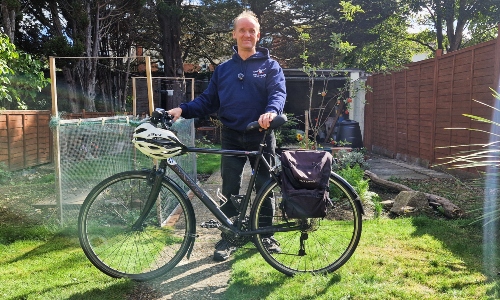Tracing 55 miles from the capital to the south coast, the London to Brighton cycle ride isn’t for the faint-hearted – and this year, Dr Norman Lazarus became the oldest person to ever complete the challenge.
“I’m only 89, so really I’m still young,” he remarks with a smile.
Long-distance cycling has been a passion of Norman’s since he took up the sport in his 50s. “I wanted to keep active, so I chose to start cycling,” he says. “I love it. When I cycle, I’m not doing it because I feel like I need to do some exercise; I’m doing it because I love riding in the countryside, and everything else is just a bonus.”
Norman’s London to Brighton ride had another bonus too, as he used the event to fundraise for Age UK. “I don’t normally cycle for charity,” he says. “But Age UK is concentrating on lots of aspects of ageing which coincide with what I’m researching, and I’d love for more money to go towards that subject.”

We’re all going to deteriorate as we get older, but if you look after yourself and keep yourself functioning well, it means you can get the most out of every decade of your life.
Investigating ageing
Norman’s research project started following his retirement from an esteemed career in medicine and academia, when he found himself wondering about the effect that his regular bike rides were having on his health.
“I’d been taught as a medic that age and disease were synonymous,” Norman explains. “But there I was, riding with my cycling club, and all the men were about 60, 65 or older. And I thought to myself: ‘That’s funny. No one in this group is having heart attacks, or strokes, or any of the problems people say come as part of getting older.’
“So then I wondered whether exercise was helping to prevent all these things from happening, and I thought it would be nice to do a research project.”
Ever since, Norman has been working as a member of a team of physiologists at King’s College London, following a cohort of around 120 non-professional club cyclists in order to monitor the impact of regular exercise on ageing. As well as being part of the research team, Norman is also one of the project’s participants.
“All the volunteers were aged between 50 and 75 when we started, and we’ve been following them for 15 years,” Norman says. “So now the youngest is 65 and the oldest is nearly 90 – that’s me! In that time, we’ve been doing all kinds of measurements and procedures.”
Simple steps
Although the research project is still ongoing, its years of data have revealed some key trends in the lifestyles of its participants.
“What’s come out of the project is so simple, you might wonder why I’ve spent so many years researching it,” Norman laughs. “The findings come down to three things, which I call the trinity of ageing well: you’ve got to exercise, you’ve got to eat well, and you’ve got to maintain your mental wellbeing. These are the three, straightforward fundamentals – the complications arise elsewhere.”
Norman thinks that some of these complications can come in the form of unrealistic expectations. “There’s no quick fix available. People need a lifelong commitment to the right lifestyle. But equally, remember you’re not training to be an Olympic champion,” he says. “You’ve just got to eat a balanced diet and exercise about 3 days a week – enough to increase your heart rate – so you can keep functioning at an optimal level for your age. That’s the best you can do.
“Every single mammal on the planet has a lifespan – I haven’t seen any 100-year-old dogs or horses walking around! So yes, we’re all going to deteriorate as we get older, but if you look after yourself and keep yourself functioning well, it means you can get the most out of every decade of your life.”

I hope that by keeping myself fit, any period I have in the future of not being active will be as short as possible.
Recovery and resilience
Norman saw the benefits of keeping functionally fit first-hand when he faced a health setback earlier this year.
“In July, I was diagnosed with a kidney problem and ended up having the kidney removed,” he reveals. “So I worried whether I’d still be able to do the London to Brighton cycle ride in September. But after the operation, I started doing some gentle, low-level exercises, which I built up slowly. And in the end, I managed the bike ride and was very happy with myself. Because of the way I’d been living, even when I had a health problem, it gave me the resilience to recover quickly despite my age.”
For Norman, it’s important to consider how his decisions might impact his loved ones, too. “I hope that by keeping myself fit, any period I have in the future of not being active will be as short as possible,” he says. “That way, whatever medical support I need from my children will be as short as possible too. I’ve never wanted to regard them as my future carers.”
And speaking of the future, will Norman be taking on the London to Brighton bike ride again next year? “I’ll give it a try,” he says. “And if I can’t do it, then I’ll just get the train home!”
Act Now, Age Better
Read about our campaign to help more people stay fit and strong in later life.




